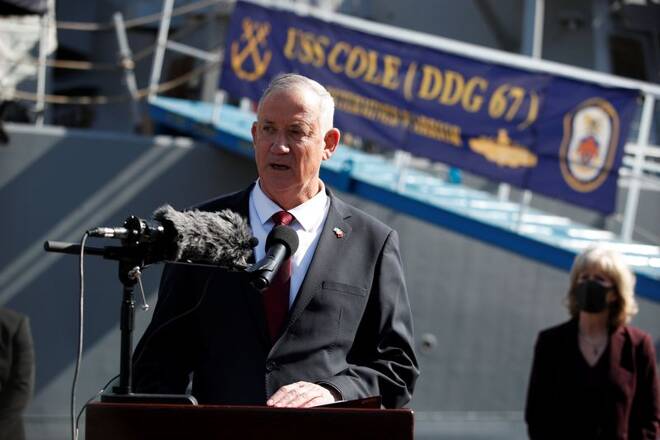Advertisement
Advertisement
Israel says it’s building regional air defence alliance under U.S
By:
By Dan Williams and Aziz El Yaakoubi JERUSALEM/RIYADH (Reuters) - Israel is building a U.S.-sponsored regional air defence alliance, the Israeli defence minister said on Monday, adding that the apparatus has already foiled attempted Iranian attacks and could be boosted by President Joe Biden's visit next month.
By Dan Williams and Aziz El Yaakoubi
JERUSALEM/RIYADH (Reuters) – Israel is building a U.S.-sponsored regional air defence alliance, the Israeli defence minister said on Monday, adding that the apparatus has already foiled attempted Iranian attacks and could be boosted by President Joe Biden’s visit next month.
Drawing closer in recent years to U.S.-aligned Arab states which share its Iran concerns, Israel has offered them defence cooperation. They have been publicly reticent on the idea.
Washington hopes more cooperation, especially on security, would help further integrate Israel in the region and isolate Iran. It may also preface more normalisation deals with Israel, including by heavyweight Saudi Arabia, following the forging of relations with the United Arab Emirates and Bahrain in 2020.
Unveiling what he dubbed the “Middle East Air Defence Alliance” in a briefing to Israeli lawmakers, Defence Minister Benny Gantz said such cooperation is already under way.
“Over the past year I have been leading an extensive programme, together with my partners at the Pentagon and in the U.S. administration, that will strengthen the cooperation between Israel and countries in the region,” he said, according to an official transcript.
“This program is already operative and has already enabled the successful interception of Iranian attempts to attack Israel and other countries.”
The transcript did not name partner countries, give further details on the thwarted attacks nor provide details on the mechanics of the alliance.
The U.S. Embassy in Jerusalem did not immediately respond to a request for comment.
Speaking to Reuters on condition of anonymity, an Israeli official said partner countries were synchronising their respective air defence systems through remote electronic communication, rather than using the same physical facilities.
“DESPERATION”
Iran said joint military activities of Israel and some Arab countries in the Gulf are done “out of desperation”.
Saudi Arabia, Bahrain and the UAE governments did not immediately respond to requests for comments on the alliance mentioned by Gantz.
A Western diplomat in the region told Reuters last week that Washington was still working to convince Gulf Cooperation Council states as a bloc to agree on joining a U.S.-Israeli integrated air defence system. The GCC groups Saudi Arabia, the UAE, Bahrain, Qatar, Kuwait and Oman.
“(The proposal) would help to fill the gap left by the withdrawal of U.S. hardware over the last two years from the region … and would draw Israel and Saudi Arabia closer to reaching a nomalisation deal,” the diplomat said.
Riyadh, which was supportive of Israel’s rapprochement with its Gulf neighbours, has said normalising its own relations with Israel would need the creation of a sovereign Palestinian state with Jerusalem as its capital.
“I hope that we will take another step forward in this aspect (of regional cooperation) during President Biden’s important visit,” Gantz said.
Biden is visiting the region July 13-16 with stops in Israel and Saudi Arabia, where he will meet Arab leaders.
As tensions have mounted over Tehran’s nuclear programme, Israel, Saudi Arabia, the UAE and parts of Iraq have come under UAV or missile strikes that were claimed by or blamed on Iranian-backed militias.
Gulf states had been frustrated over perceived reduced U.S. commitment to regional security and for not addressing their concerns over Iran’s missile programme and regional proxies.
(Additional reporting by Parisa Hafezi in Dubai; Editing by William Maclean)
About the Author
Reuterscontributor
Reuters, the news and media division of Thomson Reuters, is the world’s largest international multimedia news provider reaching more than one billion people every day. Reuters provides trusted business, financial, national, and international news to professionals via Thomson Reuters desktops, the world's media organizations, and directly to consumers at Reuters.com and via Reuters TV. Learn more about Thomson Reuters products:
Latest news and analysis
Advertisement
